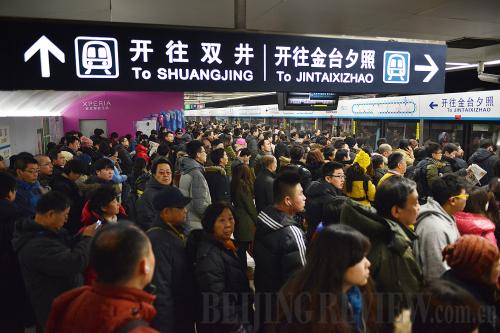|
 |
|
WAITING TO GET ON: A crowded platform on Beijing's Subway Line 10 (XINHUA) |
The Beijing Municipal Government's latest indication of a possible subway fare increase has triggered heated public debate. According to a working draft released by the municipal government on December 13, 2013, local authorities are mulling over proposals to raise subway fares in an apparent bid to cut the overall cost of transport subsidies in the city. Plans are said to involve a differential pricing system during peak hours to ease the volume of passenger, the government said in the draft.
Beijing has the cheapest public transportation system in the country. In 2007, the city reduced its subway fare from 3 yuan ($0.49) to 2 yuan ($0.33) regardless of distance traveled and slashed bus fares to 0.4 yuan ($0.07), in an effort to encourage people to use public transportation and ease congestion on the roads.
While some experts agree raising subway fares will ease the burden on the city's coffers, many local commuters believe that it will have little effect in helping ease the rush-hour commuter flow. The following are excerpts of public opinion:
Supporters
Yu Ling (Time Weekly): People who oppose raising fares often emphasize the public-service nature of the subway. They believe they should have the right to enjoy the benefits of a low-price subway service.
As a form of transportation, the subway should also be operated in accordance with market law. We may call it a kind of "quasi-public service." A "quasi-public service" can be funded by either the government or private entities.
In recent years, a trend has seen many governments worldwide begin to change their thoughts on subway operation and make efforts to attract investment from the market to relieve the pressure of inadequate funding and improve efficiency.
In the same way, the Beijing Municipal Government also wants to bring in market mechanisms to relieve the financial pressures of its own subway operations. If the price is made artificially low, market laws will be broken and private investment cannot be attracted. The action that brought down the subway fare in 2007 was just an expedient measure to relieve the pressure of traffic for the 2008 Olympic Games. This time, the municipal government's decision to raise the subway fare is to adjust the ticket price from an abnormal state to a normal one.
Zhong Yi (Jiefang Daily): I have to admit that a low subway fare is a good thing for people in the short term. However, from a long-term perspective, the reduced fare will bring about bad results.
A ticket price that is set too low will result in inefficient transportation, with people who do not have to, taxing the system and posing possible security problems.
Second, rising subsidies for low-cost subway services have placed a greater financial burden on the municipal government. According to the Beijing Finance Bureau, the city earmarked 15.69 billion yuan ($2.56 billion) for buses and subways in 2011. The figure rose to 17.5 billion yuan ($2.85 billion) in 2012. With the expansion of the subway system along with an increase in passenger volume and rising fuel costs, the cost of subsidizing public transportation will continue to rise. It is expected to hit 18 billion yuan ($2.94 billion) in 2013. With more subsidies, at the expense of taxpayers, going to public transportation, there will be less public spending in medical, educational, housing and social security sectors.
Third, a low price means a low-quality service. Without benefits from the operation, subway companies have no incentives to provide sufficient services. I have heard passengers complaining there are no elevators at many subway stations in Beijing.
| 